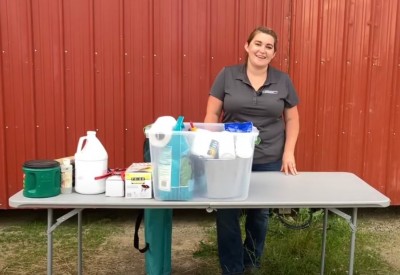Preparing your Lambing and Kidding Kits
Amy Barkley, Team Leader & Livestock Specialist
Southwest New York Dairy, Livestock and Field Crops Program

Preparing your Lambing and Kidding Kits
Amy Barkley, Livestock Specialist, SWNYDLFC
As the daylight hours fade and start to increase again over the next month, we're going to start seeing the first lambs and kids of the season born. Now's the time to check your lambing or kidding kit inventory to restock, replace out-of-date supplements and antibiotics, and mentally prepare for the upcoming season!
The Cornell Sheep and Goat Program and SWNYDLFC Team outline the following to be included in lambing and kidding kits, divided up into the "essentials" and "advanced essentials".
The Essentials:
- The phone number of your vet. Ensuring you have a vet ready to call, preferably one with whom you already have a working relationship, can mean a speedier diagnosis and treatment if things take a turn.
- Mild dish soap to clean equipment, the udder if it's dirty, and your hands.
- Sterile lubricant for internal exams.
- Single use OB or exam gloves protect you from uterine and fetal fluids, which can carry disease-causing agents. It also protects the uterus from the introduction of excessive amounts of bacteria or fluids from other animals that you've recently assisted.
- Tri-Iodine 7 Tincture is used as a naval dip to prevent infections.
- Clean towels/rags/newspaper to dry kids off if no clean hay or straw is present. It's also handy to have these to wipe your hands and clean equipment.
- Clean, non-porous buckets made of stainless steel or solid plastic carry water or sanitizer and can be used to warm colostrum or mix colostrum replacer.
- Digital rectal thermometers are used to check the body temperature of the younglings and the dam to check for fever or hyperthermia.
- Extra colostrum saved from other dams in the herd/flock or a colostrum replacer powder that's in date allows for you to get a first milk into a lamb or kid if they don't get it from their dam.
- A bottle with a nipple sized for small ruminants at the ready allows for emergency feeding in the case that there's something amiss with the dam's milk supply, udder conformation, the dam passes during labor and delivery, or the dam rejects the lamb.
- Flashlights, battery-operated lanterns, or head lamps (with new batteries) come in handy when you're assisting mothers and babies in an area with no electricity or lights.
- Access to water, preferably warm, allows for easy clean-up, warming of colostrum, or mixing of colostrum replacer.
The Advanced Essentials:
- Antibiotic recommended and prescribed by your veterinarian to manage the potential for infections caused by dystocia or a retained placenta.
- Stomach tube and 60 cc dosing syringe for tubing newborns or older kids that are weak but able to swallow.
- Warming box to warm hypothermic newborns. Many times, this requires them to be brought inside a heated shop or the house.
- Vitamin E / Selenium (Bo-Se) injections or oral paste for those newborns or youngsters showing symptoms of white muscle disease, or as a prophylactic for babies from those herds or flocks that chronically struggle with white muscle disease.
- 50% dextrose solution to be diluted with boiled water and cooled to give intraperitoneal injections in very weak lambs. A 20 gauge x 1.5" sterile needle and 60mL sterile syringe is also required.
- 23% calcium gluconate for treating milk fever
- Propylene glycol for treating ketosis
We recommend keeping these supplies readily accessible during the lambing and kidding seasons. Storing the items in a clear plastic tote can easily help you find the items you need while protecting them from dust and debris.
A video series of goat reproduction and kidding, including videos explaining more about what to expect during the birthing process and afterwards, can be found on our team's YouTube page @cceswnydlfc or https://www.youtube.com/@cceswnydlfc/playlists
Upcoming Events
Boots in the Barn: Cornell Dairy Research Updates
January 13, 2026
January 20, 2026
January 27, 2026
February 3, 2026
February 10, 2026
February 17, 2026
February 24, 2026
Join us for some or all!
Deerworm and Flukes in Small Ruminants Webinar
February 25, 2026 : Deerworm and Flukes in Small Ruminants Webinar
Dr. Mary Smith from Cornell's College of Veterinary Medicine and Dr. Rachel White from UMaine Cooperative Extension will be discussing the lifecycles, signs, prevention, and management of deerworm and liver flukes in small ruminants.
NYSDEC How to Get Certified Course
March 3, 2026 : NYSDEC How to Get Certified Course
Ellicottville, NY
NYSDEC training course in preparation to take the pesticide applicator exam.
Announcements
Cows, Crops & Critters Newsletter Sponsorship
TRYING TO REACH GROWERS AND AGRIBUSINESSES IN OUR SOUTHWEST REGION OF NEW YORK?Weekly Email Update: Shared with 625+ households who have signed up with our program.
Monthly Paper Mailer: To reach our stakeholders and farmers who lack internet access, we send out a monthly mailer where your company's logo and contact information would be featured with a mailing list of 330+ households.
If you sponsor our weekly and monthly publications you reach approximately 955 households.





